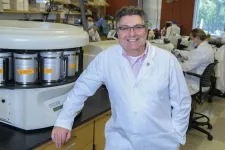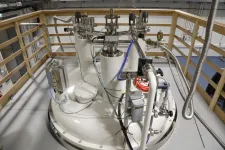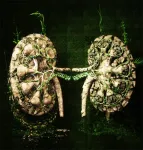(Press-News.org) The Juvenile Diabetes Research Foundation awarded researchers at the University of Arizona College of Medicine – Tucson a $2.7 million grant for clinical testing of a novel, oxygen-enabled, implantable pouch containing pancreatic cell clusters that produce insulin.
Type 1 diabetes is an autoimmune disease in which the body makes insufficient insulin, a hormone produced in the pancreas that regulates blood glucose levels. The disease is currently treated with supplemental insulin delivered by manual injection or through a subcutaneous insulin pump. Patients with Type 1 diabetes need to test their blood sugar levels and receive insulin multiple times a day to ensure their blood glucose stays within the recommended range.
The implantable pouch, developed by a team led by Klearchos Papas, PhD, professor of surgery, is a bioartificial pancreas containing groups of cells called islets that can produce insulin. The team hopes the implant will remove the need for people to test their blood-sugar levels or inject supplemental insulin. Clinical testing is expected to begin within three years.
“Our approach will eliminate big swings in blood sugar that can cause all kinds of problems. It controls blood-sugar levels so you don’t have to think about it.” Papas said.” “There are some similar encapsulation approaches being tested, but nothing really has worked. We believe we have the differentiating component that will make it work, so we’re very excited.”
The key difference with Papas’ device is the delivery of oxygen to the pouch in combination with highly specialized membranes. Oxygen encourages blood vessel growth within the pouch, improving the viability and function of the islet cells within. The membranes promote the growth of new blood vessels near or within the device to allow for improved nutrient exchange and a reduced foreign-body response, a common issue with implants.
The implant prototype uses islets from donors who may not be immunologically matched with the recipient, making it similar to an organ transplant but without the need for major surgery. Immune-suppressing drugs are required to prevent the immune system from attacking the donor cells.
Researchers in the field believe that lab-grown islets genetically modified to be compatible with a person’s immune system could be available in three to five years, removing the need for immunosuppression. Papas is hopeful clinical testing and validation of the implant is complete by the time lab-grown cells become available so that people with Type 1 diabetes can benefit from pancreas-like functionality without the potentially harmful effects of immunosuppression.
END
College of Medicine – Tucson receives $2.7 million grant for diabetes research
A Juvenile Diabetes Research Foundation grant will fund clinical trials for an implantable device that could eliminate the need for glucose testing and insulin injections in the management of Type 1 diabetes
2024-03-07
ELSE PRESS RELEASES FROM THIS DATE:
Instruct-ERIC Director Harald Schwalbe welcomes Germany as a member of European Research Infrastructure Consortium
2024-03-07
FRANKFURT. Bettina Stark-Watzinger, Germany’s Federal Minister of Education and Research, emphasizes: "The rapid and successful development of active substances against the SARS-CoV-2 virus illustrated the importance of good and trusting international cooperation among scientists, especially in the field of integrated structural biology. Exchanging information at an international level is crucial, especially when it comes to using specialist infrastructures. There are many advantages to us joining Instruct-ERIC, which ...
Infant health suffered during baby formula shortage
2024-03-07
The nationwide baby formula shortage two years ago forced many parents to involuntarily switch brands or types. A recent survey from researchers at the University of California, Davis, highlights how these substitutions led to undesirable effects for babies, including vomiting. The study was published in the journal Nutrients.
In an online survey of 178 parents whose infants were under six months of age during the May 2022 shortage, 81% of respondents switched formulas, with 87% of those switching because they could not find the formula ...
NJIT Chemist wins Wallace H. Coulter Award for Career Achievements
2024-03-07
NJIT Distinguished Professor of Chemistry Wunmi Sadik has recently been honored with the prestigious Wallace H. Coulter Lectureship during a guest appearance at one of the largest scientific conferences on laboratory science in the world, Pittcon.
The Wallace H. Coulter Lectureship is presented each year at Pittcon to an “outstanding individual who has demonstrated a lifetime commitment to, and made important contributions that have had a significant impact on education, practice and/or research in laboratory science.”
Sadik, chair of NJIT's ...
Ochsner Health cardiologist receives “Women in STEM” award
2024-03-07
NEW ORLEANS, La – Ochsner Health cardiologist Salima Qamruddin, MD, MPH, FASE, FACC has been named a 2024 “Women in STEM” honoree by the American Heart Association and Entergy. This annual award gives recognition to six local female leaders who have demonstrated an exceptional commitment and made an impact in the field of science, technology, engineering and math across New Orleans.
As an honoree, Dr. Qamruddin was formally recognized at the 2024 “Go Red for Women” luncheon on Friday, March 1. The event, held at the Hilton Riverside, celebrated the accomplishments of all six “Women in ...
Blood mutations increase risk for acute kidney injury: study
2024-03-07
A U.S.-Canadian research collaboration led by Vanderbilt University Medical Center has identified common, age-associated changes in the blood as a risk factor for acute kidney injury (AKI), which occurs in more than 1 in 5 hospitalized adults worldwide.
This discovery, reported in the journal Nature Medicine, could open the door to new, more effective treatments for AKI and a way to prevent its progression to end-stage renal disease requiring kidney dialysis.
The focus of this investigation was clonal hematopoiesis ...
MPFI establishes its first international partner group
2024-03-07
The Max Planck Florida Institute for Neuroscience will establish its first International Partner Group in India. Dr. Anant Jain, a former MPFI scientist in the lab of Dr. Ryohei Yasuda, will begin his own research group at CHINTA (Centres for High Impact Neuroscience and Translational Applications), TCG Centres for Research Education Science and Technology (CREST).
“I am thrilled to head the Max Planck Partner Group, which will create a formal channel of collaboration between my new group and the experts at MPFI. This partnership will help launch my research program in India,” says Dr. Jain.
The Max Planck Partner Group program aims to ...
CHOP researchers find pre-existing mental health diagnoses may prolong time to recovery from concussion
2024-03-07
Philadelphia, March 7, 2024 – Researchers from the Minds Matter Concussion Program at Children’s Hospital of Philadelphia (CHOP) found that youth with pre-existing mental health diagnoses experienced a greater burden from emotional symptoms after concussion, as well as a prolonged time to recovery. Importantly, the study was the first of its kind to find a “dose-response” effect--that a greater number of mental health diagnoses was associated with increased emotional symptoms after concussion and a longer recovery. This finding suggests that addressing pre-existing mental ...
UT Health San Antonio receives $16.4 million from CPRIT over six months, adding transformative expertise, bolstering cancer research
2024-03-07
SAN ANTONIO, March 7, 2024 – The University of Texas Health Science Center at San Antonio (UT Health San Antonio) has secured approximately $16.4 million in funding from the Cancer Prevention and Research Institute of Texas the past six months, attracting three top cancer researchers and advancing child and adolescent cancer research.
A primary driver of San Antonio’s leading $44.1 billion health care and biosciences sector, UT Health San Antonio is the largest academic research institution in South Texas with an annual research portfolio of $413 million, and accounts for more than 70% of National Institutes of Health research funding to all institutions locally.
Simon ...
Current state of dermatology mobile applications with AI features
2024-03-07
About The Study: This scoping review determined that although artificial intelligence (AI) dermatology mobile apps hold promise for improving access to care and patient outcomes, in their current state, they may pose harm due to potential risks, lack of consistent validation, and misleading user communication. Addressing challenges in efficacy, safety, and transparency through effective regulation, validation, and standardized evaluation criteria is essential to harness the benefits of these apps while minimizing risks.
Authors: Veronica Rotemberg, M.D., Ph.D., of Memorial Sloan Kettering Cancer Center in New York, and Associate Editor, JAMA Dermatology, is the corresponding ...
Surprise: Egg-laying amphibian provides nutrient-rich “milk” to its young
2024-03-07
An egg-laying species of worm-like amphibian feeds a lipid-rich milk-like substance to its hatchlings, according to a new study. The findings report a previously unobserved behavior and offer new insight into the species’ parental care and communication. Among vertebrates, the embryonic yolk is often the only nutritional investment mothers offer to feed offspring. However, some species have developed parental care behaviors involving the production and provisioning of specialized foods, such as the production of lipid-rich milk in mammals. Feeding offspring with nutrient-rich milk was long seen as a trait unique to mammals. However, several non-mammalian ...
LAST 30 PRESS RELEASES:
COVID-19 vaccination during pregnancy may help prevent preeclampsia
Menopausal hormone therapy not linked to increased risk of death
Chronic shortage of family doctors in England, reveals BMJ analysis
Booster jabs reduce the risks of COVID-19 deaths, study finds
Screening increases survival rate for stage IV breast cancer by 60%
ACC announces inaugural fellow for the Thad and Gerry Waites Rural Cardiovascular Research Fellowship
University of Oklahoma researchers develop durable hybrid materials for faster radiation detection
Medicaid disenrollment spikes at age 19, study finds
Turning agricultural waste into advanced materials: Review highlights how torrefaction could power a sustainable carbon future
New study warns emerging pollutants in livestock and aquaculture waste may threaten ecosystems and public health
Integrated rice–aquatic farming systems may hold the key to smarter nitrogen use and lower agricultural emissions
Hope for global banana farming in genetic discovery
Mirror image pheromones help beetles swipe right
Prenatal lead exposure related to worse cognitive function in adults
Research alert: Understanding substance use across the full spectrum of sexual identity
Pekingese, Shih Tzu and Staffordshire Bull Terrier among twelve dog breeds at risk of serious breathing condition
Selected dog breeds with most breathing trouble identified in new study
Interplay of class and gender may influence social judgments differently between cultures
Pollen counts can be predicted by machine learning models using meteorological data with more than 80% accuracy even a week ahead, for both grass and birch tree pollen, which could be key in effective
Rewriting our understanding of early hominin dispersal to Eurasia
Rising simultaneous wildfire risk compromises international firefighting efforts
Honey bee "dance floors" can be accurately located with a new method, mapping where in the hive forager bees perform waggle dances to signal the location of pollen and nectar for their nestmates
Exercise and nutritional drinks can reduce the need for care in dementia
Michelson Medical Research Foundation awards $750,000 to rising immunology leaders
SfN announces Early Career Policy Ambassadors Class of 2026
Spiritual practices strongly associated with reduced risk for hazardous alcohol and drug use
Novel vaccine protects against C. diff disease and recurrence
An “electrical” circadian clock balances growth between shoots and roots
Largest study of rare skin cancer in Mexican patients shows its more complex than previously thought
Colonists dredged away Sydney’s natural oyster reefs. Now science knows how best to restore them.
[Press-News.org] College of Medicine – Tucson receives $2.7 million grant for diabetes researchA Juvenile Diabetes Research Foundation grant will fund clinical trials for an implantable device that could eliminate the need for glucose testing and insulin injections in the management of Type 1 diabetes




